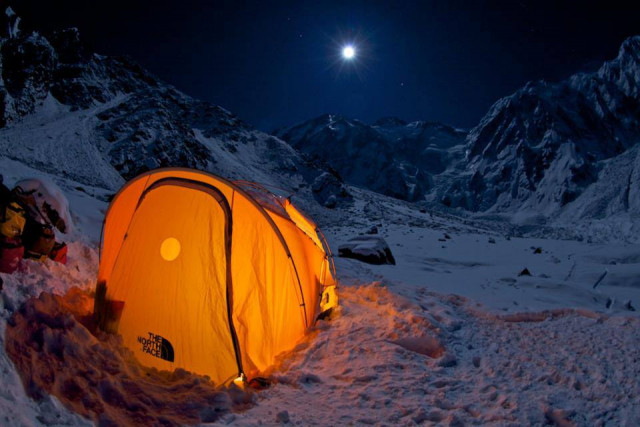Mountaineering: ‘Foreign climbers will return, but only with security’
Absence of rescue operations deter mountaineers; no more summit plans for K2.

Foreign climbers want to know whether the culprits of the Nanga Parbat killings have been caught and punished, says APC president. PHOTO: FACEBOOK.COM/HUNZAGUIDESPAKISTAN/FILE
Militant attacks might not deter foreign mountaineers from visiting Pakistan’s glorious peaks in the future, but for now, the international mountaineering community is looking for some answers.
In a press conference held to welcome back the three Pakistani mountaineers who participated in the successful Pak-China joint expedition to scale Muztagh Ata in China, Colonel (retd) Manzoor Hussain, president of the Alpine Club of Pakistan (ACP), said most foreign climbers ask the ACP authorities just two questions since Nanga Parbat incident.
“They want to know whether the culprits of the Nanga Parbat killings have been caught and punished and they ask about the security measures the Government of Pakistan has adopted in the incident’s aftermath,” he said.
Though the questions have been conveyed to the Ministry of Interprovincial Coordination and the G-B police have arrested four of the 16 suspects so far, foreign mountaineers are mostly concerned with how they are going to get to G-B or Chitral from Islamabad.

“If we can give them the confidence that their security will be ensured, there is no reason why they would not want to come to Pakistan,” he opined.
Hussain said the general assembly meeting of the Asian Mountaineering and Climbing Federation on September 29 and the International Alpine Federation’s meeting on October 2 will provide Pakistan opportunities to project its security measures on the world-level.
Muztagh Ata expedition
The expedition was planned before the Nanga Parbat incident occurred, but was conducted with urgency after the incident to pay tribute to the two slain Chinese climbers and to express solidarity with the grieving Chinese mountaineering community.
Three Pakistanis and five Chinese climbers took part in the Pak-China joint expedition. The Pakistani team left Islamabad on July 5, reaching the mountain’s base camp on July 10. The expedition scaled Muztagh Ata on July 24, despite strong winds and bad weather.
Rehmatullah, a Pakistani climber, said the Chinese mountaineers considered the Nanga Parbat incident an attempt to sabotage Pak-China friendship.
“But they agreed with us that such militant attacks cannot undermine the friendship between the two countries,” he added.
The expedition’s members observed a two-minute silence at the base camp to pay homage to the slain Chinese climbers, Yang Chunfeng and Rao Jianfeng --- experienced climbers who had scaled 19 peaks between the two of them.
Rehmatullah seemed concerned about the current state of affairs in the area and said initial misreporting in the media about the location of the attack had affected tourism in Fairy Meadows.
“The G-B government has sealed the entire area,” Rehmatullah said. “Instead of encouraging mountaineers by providing them with adequate security, they have barred entry to rid themselves of their own responsibilities.”
Lack of rescue capabilities
Even without the Nanga Parbat killings, the 2013 climbing season has been turbulent and unusually dramatic for foreign climbers. Three Iranians and three Spanish climbers have been presumed dead after they went missing on Broad Peak and Gasherbrum I respectively. A Polish mountaineer died after he fell during descent from Gasherbrum I and a father-son climbing duo from New Zealand died this week during an avalanche on K2.
All summit plans to K2 were abandoned for the season during a meeting at the K2 base camp, a British explorer and adventurer, announced in a July 27 Facebook update. Saying he was “devastated” by the “collective and reluctant decision” of different expedition teams but said it was due to “deep and dangerous snow conditions on the mountain.”
Hussain said it is a “serious issue” that there are currently no rescue organisations in Pakistan.
“We should have trained rescuers who are acclimatised with high altitudes who are stationed near the mountains permanently,” he said. “We are trying to work with different government agencies to have rescue arrangements, at least during the climbing season.”
Usually, army staff and porters from mountaineering expeditions take part in rescue operations.
Published in The Express Tribune, August 1st, 2013.



















COMMENTS
Comments are moderated and generally will be posted if they are on-topic and not abusive.
For more information, please see our Comments FAQ